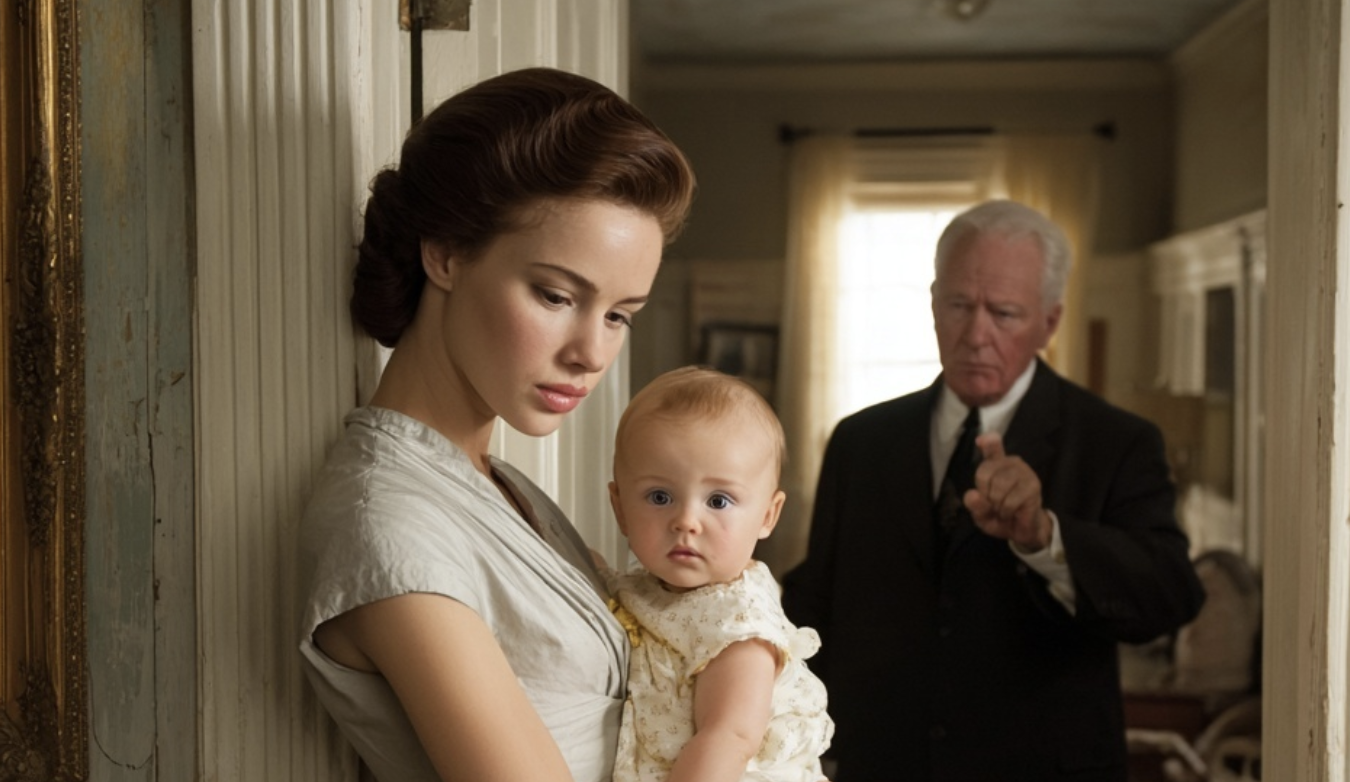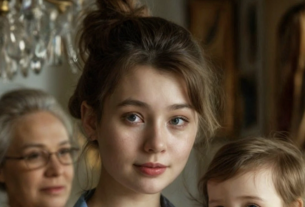“Who is this?” Sergey Alexandrovich asked, voice cold as steel, the moment Anna stepped over the threshold with a newborn bundled against her chest. There was no gladness, no wonder—only a flint of irritation. “Do you honestly expect me to accept this?”
He had come home from yet another weeks-long business trip: contracts, meetings, flights—his whole life a conveyor belt of departure lounges and conference tables. Anna had known it before the wedding and took it as part of the bargain.
They met when she was nineteen, a first-year medical student, and he was already the sort of man she had once scrawled into her school-girl diary: established, confident, unshakeable. A rock to shelter behind. With him, she had believed, she would be safe.
So when the evening meant to be among her brightest curdled into nightmare, she felt something inside her fracture. Sergey looked at the child, and his face went foreign. He hesitated—then his voice came down like a blade.
“Look at him—nothing of me. Not a single feature. This is not my son, do you hear? Do you take me for a fool? What game are you playing—trying to hang noodles on my ears?”
The words slashed. Anna stood rooted, heart hammering in her throat, head ringing with fear. The man she had trusted with everything was accusing her of treachery. She had loved him wholly; she had given up her plans, her ambitions, her old life to become his wife, to give him a child, to build a home. And now he spoke to her like an enemy at the gate.
Her mother had warned her.
“What do you see in him, Anyuta?” Marina Petrovna would say. “He’s nearly twice your age. He already has a child. Why volunteer to be a stepmother? Find an equal, someone who will be your partner.”
But Anna, glowing with first love, hadn’t listened. Sergey, to her, was not simply a man—he was fate itself, the protective presence she had craved since childhood. Having grown up without a father, she had longed for a strong, reliable husband, the keeper of a family she could finally call her own.
Marina’s caution was perhaps inevitable; to a woman of Sergey’s years, he looked a peer, not a match for her daughter. Still, Anna was happy. She moved into his spacious, well-appointed house and began to dream.
For a while, life did look perfect. Anna kept at her medical studies, living out, in part, her mother’s unrealized wish—Marina had once wanted to be a doctor, but an early pregnancy and a vanishing man had ended that dream. She raised Anna alone. The absence of a father left a hollow that made her daughter lean toward the promise of a “real” man.
Sergey filled that space. Anna imagined a son, a complete family. Two years after the wedding, she learned she was pregnant. The news flooded her like spring light.
Her mother worried. “Anna, what about your degree? You won’t throw it all away? You’ve worked so hard!”
The fear was reasonable—medicine demanded sacrifices: exams, rotations, pressure without relief. But none of it mattered in the face of what grew within her. A child felt like the meaning of everything.
“I’ll go back after maternity leave,” she said gently. “I want more than one—two, maybe three. I’ll need time.”
Those words triggered every alarm in Marina’s heart. She knew what it meant to raise a child alone; hard years had taught her prudence. “Have only as many children,” she liked to say, “as you can raise if your husband walks.” And now her worst thought stood on the doorstep.
When Sergey threw Anna out as if she were a nuisance, something in Marina broke. She gathered her daughter and grandson close, fury trembling in her voice.
“Has he lost his mind? How could he? Where is his conscience? I know you—you would never betray.”
But warnings and years of quiet advice had collided with Anna’s stubborn belief in love. All Marina could say now was bitter and simple: “I told you who he was. You didn’t want to see.”
Anna had no strength for reproach. The storm inside her left only pain. She had pictured a different homecoming: Sergey taking the baby, thanking her, embracing her—three of them welded into a real family. Instead: coldness, rage, accusation.
“Get out, you traitor!” he shouted, his decency shredding. “Who was it? You think I don’t know? I gave you everything! Without me you’d be crammed in a dorm, barely scraping through med school, slaving in some forgotten clinic. You can’t do anything else. And you bring another man’s child into my house? Am I supposed to swallow that?”
Shaking, Anna tried to reach him. She pleaded, told him he was wrong, begged him to think.
“Seryozha, remember your daughter when you brought her home? She didn’t look like you straight away. Babies change; features emerge with time—eyes, nose, gestures. You’re a grown man. How can you not understand?”
“Not true!” he snapped. “My daughter looked exactly like me from the start. This boy isn’t mine. Pack your things. And don’t count on a single kopeck!”
“Please,” Anna whispered through tears. “He’s your son. Do a DNA test—it will prove it. I’ve never lied to you. Please… believe me, if only a little.”
“Go to laboratories and humiliate myself?” he barked. “You think I’m that gullible? Enough. We’re finished.”
He burrowed deeper into his certainty. No plea, no logic, no memory of love could pierce it.
Anna packed in silence. She lifted her child, took one last look at the house she had wanted to make a hearth, and stepped into the unknown.
There was nowhere else to go but home. As soon as she crossed her mother’s threshold, the tears came.
“Mama… I was so foolish. So naive. Forgive me.”
Marina did not cry. “Enough. You’ve given birth—we’ll raise him. Your life is beginning, do you hear? You’re not alone. Pull yourself together. You are not quitting your studies. I’ll help. We will manage. That’s what mothers are for.”
Words failed Anna; gratitude flooded her in place of speech. Without Marina’s steady hands, she would have shattered. Her mother fed and rocked the baby, shouldered the night shifts, and guarded Anna’s unbroken line back to school and forward to a new life. She didn’t complain, didn’t scold, didn’t stop fighting.
Sergey disappeared. No alimony, no calls, no interest. He slipped away as if their years together had been a fever dream.
But Anna remained—no longer alone. She had her son. She had her mother. In that small, real world, she found a deeper love than the one she had chased.
The divorce felt like a building collapsing inside her. How could a future so carefully imagined turn to ash overnight? Sergey had always had a difficult temperament—jealous, possessive, a man who mistook suspicion for vigilance. He had explained his first divorce as a “financial disagreement.” Anna had believed it. She hadn’t understood how easily he erupted, how swiftly he lost control over the smallest, most innocent things.
In the beginning he had been tenderness itself—attentive, generous, solicitous. Flowers for no reason, questions about her day, little surprises. She thought she’d found her forever.
Then Igor was born, and she poured herself into motherhood. As he grew, she recognized a duty to herself too. She went back to university, determined to be not just a graduate but a true professional. Marina backed her in every way—childcare, money when it was tight, encouragement when it wasn’t.
Her first work contract felt like a flag planted on new ground. From then on she supported the family herself—modestly, yes, but with pride.
The chief physician at the clinic saw something immediately—focus, stamina, a hunger to learn. A seasoned woman with clear eyes, Tatiana Stepanovna took Anna under her wing.
“Becoming a mother early isn’t a tragedy,” she told her gently. “It’s strength. Your career is ahead of you. You’re young. What matters is that you have a spine.”
Those words were a pilot light. Anna kept going. When Igor turned six, a senior nurse at his grandmother’s hospital reminded her, not unkindly, that school was coming fast and the boy wasn’t quite ready. Anna didn’t panic; she acted. Tutors, routines, a small desk by the window—she built the scaffolding for his first steps into study.
“You’ve earned a promotion,” Tatiana said later, “but you know how it is—no one advances here without the numbers behind them. Still… you have a gift. Real medical instinct.”
“I know,” Anna answered, calm and grateful. “And I’m not arguing. Thank you—for everything. Not only for me. For Igor.”
“Oh, enough,” Tatiana waved, embarrassed. “Just justify the trust.”
Anna did. Her reputation grew quickly—colleagues respected her, patients felt safe in her care. The compliments piled up; even Tatiana wondered aloud if there were too many.
And then, one afternoon, the past stepped into Anna’s office.
“Good afternoon,” she said evenly. “Come in. Tell me what brings you.”
Sergey Alexandrovich had followed a recommendation to the best surgeon in the city and had assumed the shared initials were coincidence. The second he saw her, doubt ended.
“Hello, Anna,” he said, quietly, a tremor under the words.
His daughter, Olga, had been sick for a year with something no one could name. Tests inconclusive, specialists baffled. The child was fading.
Anna listened without interruption. When he finished, she spoke with clinical clarity.
“I’m sorry you’re going through this. It’s unbearable when a child suffers. But we can’t afford delays. We need a complete workup—now. Time is not on our side.”
He nodded. For once, he did not argue.
“Why are you alone?” she asked. “Where is Olga?”
“She’s very weak,” he whispered. “Too tired to sit up.”
He tried for composure, but Anna heard the storm beneath his restraint. As always, he moved as if money could batter down fate.
“Help her,” he said at last. “Please. Whatever it costs.”
Igor’s name never surfaced. Once, that would have split Anna open. Now she filed it away—an old wound that had scarred over.
Professional duty steadied her. Patients are not divided into “ours” and “theirs.” Still, she wanted him to understand: she wasn’t a miracle worker.
A week later, after exhaustive testing, she called. “I’ll operate,” she said. Her certainty steadied him even as fear shook him.
“What if… what if she doesn’t make it?”
“If we wait, we sign a sentence,” Anna replied. “We try.”
On the day of surgery, he hovered at the clinic, unable to leave, as if presence were prayer. When Anna finally came out to him, he rushed forward.
“Can I see her? Just a minute—just say a word—”
“You’re speaking like a child,” she said, more gently than the words. “She’s waking from anesthesia. She needs hours of rest. The operation went well—no complications. Tomorrow.”
He did not explode. He didn’t insist that he was the father and the rules didn’t apply. He only nodded and walked into the night.
He went home a broken figure, slept not at all, and returned before dawn. The city was fog and empty streets; he noticed none of it. Olga was awake now, fragile but improved. When she saw him at such an hour, she smiled faintly.
“Dad? You’re not supposed to be here.”
“I couldn’t sleep,” he admitted. “I had to see you breathing.”
For the first time, Sergey felt what fatherhood truly was. How little of real family he had, and how much of it he had ruined—twice—by will and by weakness.
When day thinned the windows, he stepped into the corridor—spent but oddly lighter—and nearly collided with Anna.
“What are you doing here?” she asked, edged with irritation. “I made the rules clear—no visits outside hours. Who let you in?”
“I’m sorry,” he said, eyes lowered. “No one. I asked the guard. I just needed to be sure she was all right.”
“The same old story, then,” Anna exhaled. “You thought money would open the door. Fine. You’ve seen her. Consider the mission accomplished.”
She passed him and slipped into Olga’s room. He waited in the hall, unwilling to walk away.
Later, he came to her office with a spring-scented bouquet and a neat envelope tucked under his jacket—gratitude, not only in words.
“I need to speak with you,” he said, steady now.
“Briefly,” she replied. “Time is scarce.”
She held the door open. He hesitated, searching for a beginning—and fate cut the knot.
The door burst inward and an eleven-year-old boy marched in, all indignation and energy.
“Mom! I’ve been standing out there forever,” he said, scowling. “I called you—why didn’t you answer?”
That day had been marked for him—no emergencies, no operations. Work had a way of devouring promises; guilt flickered across Anna’s face.
Sergey froze. The boy stood before him like a living echo.
“My son,” he managed. “My little boy.”
“Mom, who is this?” Igor asked, frowning. “Has he lost it? He’s talking to himself.”
Anna went rigid. This was the man who had called her a liar, abandoned them, sliced them out of his life as if erasing a line of text.
But she said nothing. Pain surged; behind it, something else smoldered—small but unmistakably alive.
Sergey was drowning in remorse and a fear that he did not deserve a second chance. He didn’t understand why this door had opened to him at all. He only knew he was grateful—for the dawn after a night of prayers, for a child breathing, for a woman who had once loved him and now, despite everything, had saved his daughter’s life.



